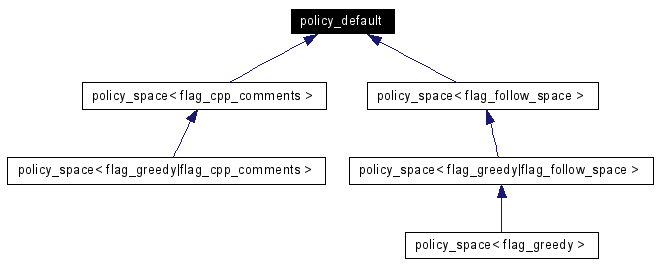
#include <const_edge.h>
Inheritance diagram for policy_default:

Definition at line 54 of file const_edge.h.
Public Types | |
| typedef policy_default | strict_policy_T |
| Defines type of strict policy for grammar evaluations in strict mode. | |
Public Member Functions | |
| template<typename StringT> | |
| StringT | region_difference (StringT const &str_, size_t first_offset_, size_t second_offset_) |
| Returns substring pointed by two offsets, but excludes defined invalid ranges. | |
Static Public Member Functions | |
| template<typename UniverseT> | |
| size_t | match (UniverseT &universe_) |
| Defines production rule function to evaluate grammar expression describing white space. | |
| template<typename UniverseT> | |
| bool | lower_bound (size_t, UniverseT &) |
| Moves upper boundary of the parseable universe outside of any region that was specified by the user. | |
| size_t | lower_bound (size_t offset_, size_t) |
| Computes lower boundary of the region provided by the user, if specified offset_ intersects with one of the client regions. | |
| void | region_adjust (size_t, int) |
| Adjusts map of regions accordingly to the specified position and delta. | |
| void | region_insert (size_t, size_t) |
| Creates new region. | |
| void | region_erase (size_t, size_t) |
| Erases region(s). | |
|
|
Defines type of strict policy for grammar evaluations in strict mode. For more information, see strict universe overview. C++ type designated as strict policy type must provide a default constructor. The strict policy is always constructed as a static member of the strict universe using the default constructor, and therefore, the strict policy must have stateless implementation. Definition at line 66 of file const_edge.h. |
|
||||||||||||
|
Computes lower boundary of the region provided by the user, if specified offset_ intersects with one of the client regions.
Definition at line 157 of file const_edge.h. |
|
||||||||||||
|
Moves upper boundary of the parseable universe outside of any region that was specified by the user.
Definition at line 137 of file const_edge.h. |
|
|
Defines production rule function to evaluate grammar expression describing white space.
Reimplemented in policy_space< flag_follow_space >, policy_space< flag_greedy|flag_follow_space >, policy_space< flag_cpp_comments >, and policy_space< flag_greedy|flag_cpp_comments >. Definition at line 109 of file const_edge.h. |
 1.3.9.1
1.3.9.1